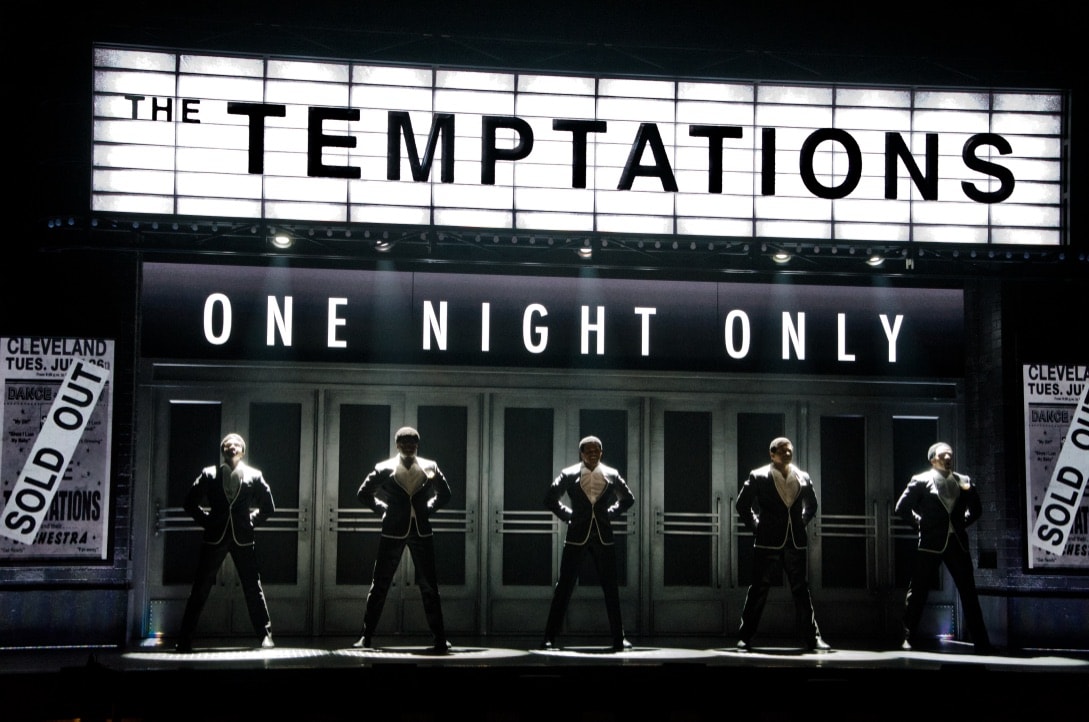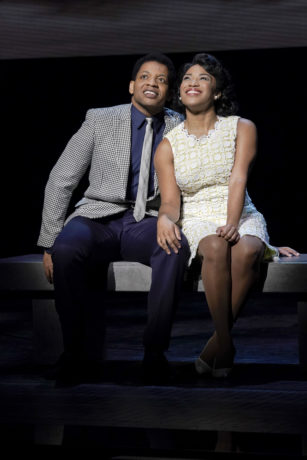Ain’t too many surprises in Ain’t Too Proud, the new jukebox musical about the supergroup The Temptations and their rise to meteoric heights. Their music defined a generation and gave voice to the unmistakable Motown sound with its roots in rhythm and blues, its touch of funk, its distinctive harmonies and tightly choreographed performances. The slick, fast-moving production – Broadway bound for sure — on stage at the Kennedy Center’s Eisenhower Theater through July 22, 2018, follows the now-standard formula devised by precursor musicals including Five Guys Named Mo, The Buddy Holly Story, Mamma Mia, Jersey Boys and Beautiful.

Ain’t Too Proud: The Life and Times of The Temptations does everything a jukebox musical requires, starting at the rocky beginning with a single narrator looking back on an upstart musical group of ruffians striving to break out. In this case, from singing on Detroit’s rough-and-tumble street corners to capturing Motown founder Berry Gordy’s attention, the Temptations develop their signature sound. Then it’s a race to the top of the pop charts, but not without bumps along the way. Internal disagreements are covered and washed over, as are womanizing and drug use, all amid a hastily drawn sketch of the turbulent 1960s – including race riots, anti-Vietnam War protests and sex and drugs. There’s much to cover, but without much depth. Even noting the years in the moving projections would help – if you weren’t born in the early 1960s, this era is only a textbook history assignment.
Based on a book by original Temptations founder Otis Williams, who is the last man standing in the group (which is still performing with new members), show librettist Dominique Morisseau provides very few surprises, taking the story straight from Williams’ account. The music, culled from “The Legendary Motown Catalog,” as the program proclaims, is what makes this – and any – jukebox musical play. And you can’t argue with a terrific songbook featuring classics penned by Norman Whitfield, Smokey Robinson, and the Isley Brothers. The musical follows the prescription so well the audience claps along just 20 minutes in when that great bar song “Shout” comes on.
Toward the final, requisite standing ovation, when Otis Williams remarks that singers come and go – there have been 24 in the Temptations over the decades – and “the only thing that lives forever is the music,” it sure sounds corny. But it sure gets the audience on its feet, clapping along for the big finale. A literal chorus line of “Temptations” – the entire cast — comes on clad in crisp white jackets to take that final bow, the 11-piece band led by Kenny Seymour finally on stage blasting away. But, alas, once more, the Eisenhower’s muddy acoustics mar the crispness and acuity of the evening.
Director Des McAnuff, who has a Tony for Jersey Boys and recently put his talents into Summer: The Donna Summer Musical, keeps the story moving so swiftly that the very few moments when a contemplative song comes on, it feels like a relief. Robert Brill’s set, with its electronic marquee and red brick backdrop with Peter Nigrini’s projections, slides performers on and off on a fast-moving rolling sidewalk and a turntable that allows backstage and side stage glimpses of the singing group in action. The show’s star? Hands down the Temptations’ songbook, from early standards “The Way You Do the Things You Do,” “My Girl,” “Since I Lost My Baby,” and “Ain’t Too Proud to Beg” to later hits like “Papa Was a Rolling Stone” and “Superstar.”
A missed opportunity in this highly produced production is the gloss over of racial issues. The Temptations were among the first black crossover artists to make it big on white Top 40 radio stations and on television, playing “American Bandstand” and “The Ed Sullivan Show” in the early 1960s – along with girl group mega-act The Supremes (and, yes, we hear “Baby Love”). But the issue of segregation and racism just speeds by, like the bus the group was traveling on that was shot at during a tour of the deep South. The Vietnam War, too, gets short shrift with just the brief number “War.” With 31 songs – mostly sung as excerpts or single verses and chorus — to cover, there’s little time left for reflection.

Keeping all this song and dance moving is the impeccable cast led by Derrick Baskin as Temptations patriarch Otis Williams. James Harkness plays baritone and choreographer Paul Williams, whose tragic story plays out in the second act. Jawan Jackson as deep-voiced bass Melvin “Blue” Franklin, plays the peacemaker of the group. As Eddie Kendricks, Jeremy Pope lends his energetic falsetto singing style to the role. Ephraim Sykes, a former Ailey II dancer, gives David Ruffin, the early standout lead, plenty of flashy dance moves, including James Brown-like jazz splits, and a cocksure attitude. Throughout they’re clad in costume designer Paul Tazewell’s sharply tailored suits and ensembles filled with the vibrant colors, sequins and shiny sharkskin fabrics that made the 1960s and ‘70s such a definitive fashion era. The clothes, in this case, did make the men: image was essential, noted Berry Gordy (Jahi Kearse), who insisted they always appear as clean-cut gentlemen. Other cast standouts include Rashidra Scott as Josephine, Williams’ wife, Nasia Thomas as early Motown soloist Tammi Terrell and Shawn Bowers as Williams’ adult son Lamont.
Choreographer Sergio Trujillo has built his career on jukebox musicals from On Your Feet, Jersey Boys, Summer, and All Shook Up, and he knows the drill. Here he takes the Temptations’ smooth signature style and amps it up a couple of notches flashier, adding more hip, more pop and more tricks to the easygoing grace the group remains known for.
Ain’t Too Proud is musical nostalgia, yet in some ways, it’s right for right now. The rocky journey lead singer Otis Williams tells of southern blacks moving “up north” and trying to make it has been smoothed over. But you can’t mistake the focus on a quintessential American trope: overcoming poverty and adversity is possible, but not without a cost – sometimes a heavy one. In this moment of national political divisions, it’s a relief to look back on a previous era where racial, class and political divides challenged our nation. We came through then. Surely we can overcome again. While the personal endings Williams shares aren’t so happy, we’re reminded that it’s the music that lives on. Corny? Sure. But sometimes that helps, too. And the music, the dancing, the songs of the Temptations will live on and that makes Ain’t Too Proud a crowd pleaser.
Running Time: Two hours and 30 minutes, with one intermission.
Ain’t Too Proud: The Life and Times of The Temptations, plays through July 22, 2018, at The Kennedy Center, 2700 F St NW, Washington, DC. For tickets, purchase them online.




